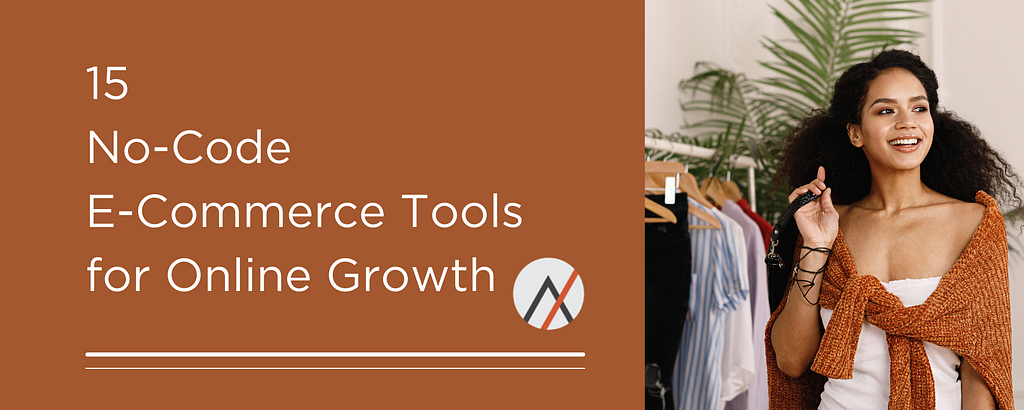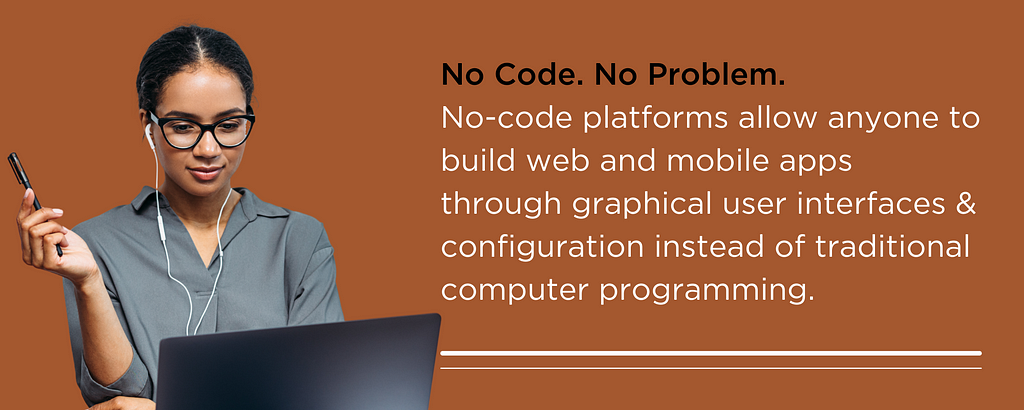Anyone can use these platforms to get an online store off the ground.

Picture this: You hear about an amazing new store in your neighborhood, so you do what any sensible person would do and Google the business. After scrolling, you find a website that looks like it was made around the same time the first Harry Potter book was published. You decide that dealing with the website is simply not worth your time. First impressions, or first clicks, mean everything and can either make or break the customer experience.
In today’s digital (and shop-from-home) age, your business’s e-commerce presence is more important than ever before. But, as a budding non-technical founder, developing an online store that collects payments, tracks inventory, and provides a streamlined customer experience can be intimidating. How will you ever find the time to learn how to code while also managing all the other aspects of a small business? Luckily, there are no-code solutions out there ready to help.
As part of our free monthly education series, Max Mirho, founder of EntrepreNerd, joined us to demystify the belief that you need to know how to code to launch an online store. Below is a list of the best no-code tools for beginners to create an e-commerce site that leaves a lasting impression. Scroll to the bottom if you want to watch Max’s entire presentation.

1. Airtable
Airtable is a low-code platform for building collaborative apps. It’s probably the least intimidating database management system out there. You can use Airtable to track, manage, and organize inventories, plus so much more. It’s also easily integrated with a lot of the other tools on this list. Airtable is free to use, but if you would like more features, the “Plus Plan” is $10/month per user, and the “Pro Plan” (which is their most popular plan) is $20/month per user.
2. Carrd
Carrd is a simple one-page website builder that follows a similar structure to WIX sites. You can choose to create a website from multiple premade templates or create one from scratch. Just click, drop, and edit. Carrd websites are optimized to adapt to any layout. So whether it be a phone, a tablet, or a laptop, you can rest assured that your website will look stunning across all devices. Carrd lets you build up to three sites per account, but if you find yourself needing more, the “Pro” option is only $19 per year.
3. Chatfuel
Got an inbox overflowing with questions about your product? Chatfuel is here to help! Chatfuel is an automated no-code chatbot that will communicate for you. Whether it’s questions about what’s in stock or inquiries about a drop in prices, you can tailor your bot to your business. Chatfuel offers a free option suitable for any budding e-commerce entrepreneur and different membership tiers based on the number of users, level of automation, and expert support.
4. Chipbot
Chipbot, an automation plug-in for your online store, replaces live chat with interactive videos to provide customers with easy self-service support. Users are able to click action links in videos to either add items to their cart or ask more questions. If you have strong founder recognition or just want to add some life to your site, give Chipbot a try. The free option has a one video limit, but you can upgrade to the “Startup” option for $10/month if your site keeps growing.
5. Deliverr
Eliminate the daily chore of heading to the post office with Deliverr, an e-commerce fulfillment service that lets small business owners sell across multiple platforms. The best thing about Deliverr? The platform actively promotes 2-day delivery so sellers can compete with Amazon. Deliverr charges per unit and offers a cost calculator to help you estimate expenses and price your products accordingly.
6. Famous
Famous enables designers to create, share, and publish stunning live mobile, tablet, and desktop experiences. Creating a product page to promote your Shopify store on Instagram or another social media platform is quick and easy. Trust us, no prior knowledge of coding is required, but your customers will never know. Famous has two payment options: a monthly subscription for $19.95 or an annual subscription for $167.58.
7. Glide
Glide lets you build fully customizable apps that sync flawlessly to a Google Sheet, an Excel file, or another data source. Within a few minutes (Glide claims less than 5), you can have a sleek and user-friendly app that can help drive sales and take your business to the next level. Use the free plan to test out your customers’ interest in an app and then upgrade to a more expensive tier if your app takes off!

8. Gumroad
Gumroad is an online platform that facilitates the sale of products by creators directly to consumers. With Gumroad, you can sell anything, anywhere, and at whatever price you want. You can also grow and engage your audience with posts, podcasts, and advanced automation workflows. The best thing about Gumroad is that there is no monthly fee! Gumroad only takes a small percentage of every sale, which isn’t the worst way to start testing a new business idea.
9. Mesa
If your business is on Shopify, then Mesa may just be the right fit for you! Mesa is the e-commerce automation platform exclusive to Shopify & Shopify Plus. The low-code platform allows you to combine all your tools, apps, and services in one place. Mesa offers all 3 of their tiers for a free 14-day trial, so give it a try before investing your hard-earned (and usually limited) startup cash in a paid plan.
10. Printful
Thinking about selling custom t-shirts, or oddly enough, custom printed shower curtains? Printful’s got you covered. The print-on-demand platform allows you to design, sell, and drop ship pretty much any product you can dream up. This is an excellent option if you’re just working on a side hustle because you don’t have to worry about inventory.
11. ReallySimpleStore
ReallySimpleStore allows you to add embeddable payment cards to your site that trigger Zapier events (check out Zapier further down) like automated emails when a product is purchased. There’s no limit to how many payment cards you can embed, and the setup is simple enough for anyone to figure out. ReallySimpleStore charges similarly to Gumroad at $5 a month, plus a small percentage of the items sold.
12. Sandbox Commerce
Sandbox Commerce lets you build fully customizable mobile apps for your online store without knowing Swift, Python, or another coding language. Sandbox promises to maximize customer lifetime value, decrease abandoned checkouts, and engage with shoppers using push notifications. Oh, another cool thing — the platform was just selected for this year’s Google Black Founders Fund! It’s a bit pricy at $99/month, so start off with a 7-day free trial.
13. Tapcart
Tapcart is an industry-leading platform for building mobile apps to enhance your e-commerce presence. It’s almost unbelievable how easily you can turn your Shopify store into an app without an ounce of coding experience. While there are many perks, like automation setup and data analysis, Tapcart runs on the more expensive side. Their least expensive option is $250/month, and their most expensive is $1,200/month.
14. Webflow
Webflow allows business owners to use their design skills to build custom websites without prior coding knowledge. That being said, there is a learning curve for this site as it’s one of the more complicated e-commerce tools on this list. But if you are willing, you can always carve out some time to visit Webflow University, a free resource that teaches you how to use all the bells and whistles. You can build a website for free, but you need to purchase a plan ranging from $12-$36/month for your site to go live.
15. Zapier
There’s always busy work involved when owning a business. But Zapier’s mission is to remove those tasks from your to-do list. Zapier moves information between your web apps automatically, so you can focus on your most important work. So if you want an email every time you get a purchase by Gumroad, you simply connect them using Zapier. The site offers a free option that allows for up to 100 tasks per month and different paid plans to subscribe to as your business takes off.
If there’s anything that this past year has taught us, it’s that an online presence is almost necessary for any business to thrive. With a market so oversaturated by mediocre websites, why not step up to the plate and really wow potential and returning customers with a sleek app or website.
Want More? Here’s Max’s Full Presentation.
https://medium.com/media/a05295bf1085dc11d1dc32ee1a7ae1e7/href
Connect with us
Learn more about Ascender: https://ascenderpgh.com/
Sign up for our newsletter or send us a note: info@ascenderpgh.com
Follow us: Twitter — Facebook — LinkedIn — Instagram
From fledgling tech companies, healthcare innovators, and nonprofits to makers, creators, services and shops, Ascender is for Pittsburgh’s entrepreneurs. We help businesses of all types in the Pittsburgh region start and build a business through education and connectivity. See how Ascender can help you.
15 No-Code E-Commerce Tools for Online Growth was originally published in Ascender on Medium, where people are continuing the conversation by highlighting and responding to this story.

